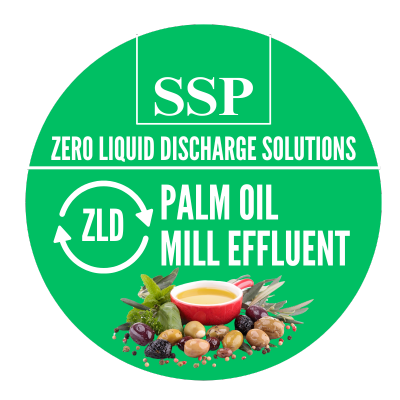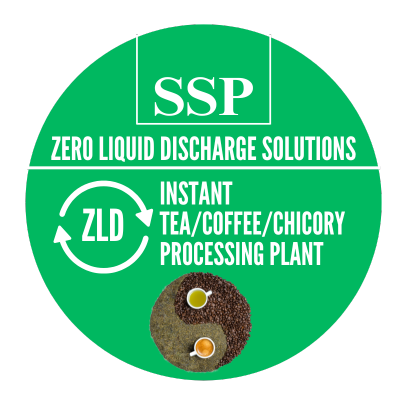





SSP's ZLD system for POME is a testament to our commitment to sustainable solutions and environmental stewardship. By effectively treating and repurposing POME waste, we not only mitigate environmental pollution but also contribute to the creation of valuable resources for agriculture and animal husbandry. Experience the power of innovation and sustainability with SSP's ZLD system for POME.
Welcome to SSP's Zero Liquid Discharge (ZLD) System tailored specifically for Palm Oil Mill Effluent (POME). At SSP, we're committed to providing sustainable and innovation-driven solutions to address the challenges of effluent treatment.
POME, a byproduct of palm fruit processing, poses significant environmental challenges due to its highly toxic and corrosive nature. Our ZLD system offers a comprehensive solution for the treatment of POME, effectively reducing chemical oxygen demand (COD) and biological oxygen demand (BOD), key metrics indicating the presence of harmful substances in the effluent.
Our ZLD system begins with a robust filtration process to remove large suspended solids from the effluent. Next, an initial decantation process utilizes centrifugal separation to separate the remaining components based on weight, further enhancing the clarity of the effluent.
The treated effluent then undergoes concentration through Mechanical Evaporation and Evaporative (MEE) technology, effectively reducing the volume of liquid waste while concentrating the valuable components. Subsequent decantation processes, using centrifugal systems, further refine the effluent, ensuring optimal clarity and purity.
Finally, the concentrated effluent is passed through a paddle dryer system, transforming it into a solid powder rich in protein content. This powder also contains good concentrations of Nitrogen, Phosphorus, and Potassium (NPK), making it suitable for use as either a fertilizer or animal feed.
SSP's ZLD system for POME is a testament to our commitment to sustainable solutions and environmental stewardship. By effectively treating and repurposing POME waste, we not only mitigate environmental pollution but also contribute to the creation of valuable resources for agriculture and animal husbandry. Experience the power of innovation and sustainability with SSP's ZLD system for POME.

SSP's ZLD solution for molasses-based distillery effluent exemplifies our commitment to sustainability and environmental stewardship. By effectively treating and repurposing spent wash waste, we contribute to the circular economy and create value from waste streams. Experience the power of innovation and sustainability with SSP's ZLD solution for distillery effluent treatment.
Welcome to SSP's Zero Liquid Discharge (ZLD) Solution tailored for molasses-based distillery effluent, commonly known as spent wash. As a leading provider of sustainable solutions, SSP addresses the challenges of distillery waste treatment with innovation-driven processes.
Molasses, a byproduct of sugar refining, serves as a primary raw material in the production of alcohol. With the global sugar industry producing approximately 140 million metric tons of molasses annually, the utilization of this resource results in significant volumes of spent wash effluent generated by distilleries worldwide.
SSP's ZLD solution offers an efficient and environmentally friendly approach to treating spent wash effluent, mitigating its impact on water bodies and surrounding ecosystems. The process begins with the collection of spent wash from distillery operations, where it undergoes a series of treatment steps to achieve zero liquid discharge.
First, the spent wash is subjected to preliminary treatment to remove suspended solids and separate heavier contaminants, enhancing the clarity of the effluent. Next, advanced filtration processes further refine the effluent, ensuring the removal of fine particulate matter and organic compounds.
The treated effluent then undergoes concentration through Mechanical Evaporation and Evaporative (MEE) technology, effectively reducing its volume while concentrating valuable components. This concentration step significantly reduces the environmental footprint of the effluent, minimizing its disposal requirements.
Finally, the concentrated effluent is further processed through innovative drying technologies, such as paddle dryers or spray dryers, to produce a solid residue rich in organic matter and nutrients. This residue can be utilized as organic fertilizer or biofuel, providing a sustainable solution for waste management and resource recovery.
SSP's ZLD solution for molasses-based distillery effluent exemplifies our commitment to sustainability and environmental stewardship. By effectively treating and repurposing spent wash waste, we contribute to the circular economy and create value from waste streams. Experience the power of innovation and sustainability with SSP's ZLD solution for distillery effluent treatment.

SSP's ZLD solution for grain-based distillery effluent exemplifies our commitment to environmental sustainability and regulatory compliance. By effectively treating and repurposing distillery waste, we minimize environmental impact and create value from waste streams. Experience the power of innovation and sustainability with SSP's ZLD solution for grain-based distillery effluent treatment.
Welcome to SSP's Zero Liquid Discharge (ZLD) Solution designed specifically for grain-based distillery effluent. With a focus on sustainability and environmental stewardship, SSP offers an innovative approach to treating distillery waste while meeting stringent regulatory standards.
Grain-based distilleries produce significant volumes of effluent during alcohol production, presenting challenges in waste management and environmental impact. Globally, distillery effluent handling norms mandate strict compliance with discharge limits for parameters such as chemical oxygen demand (COD), biological oxygen demand (BOD), and total suspended solids (TSS), highlighting the importance of effective treatment solutions.
SSP's ZLD solution for grain-based distillery effluent begins with the collection of effluent from distillery operations, where it undergoes a series of treatment steps to achieve zero liquid discharge. The process is designed to remove contaminants, reduce volume, and recover valuable resources from the effluent stream.
First, the effluent undergoes preliminary treatment to remove suspended solids and separate heavier contaminants, improving clarity and quality. Advanced filtration technologies are then employed to further refine the effluent, ensuring the removal of fine particulate matter and organic compounds.
Next, the treated effluent is subjected to concentration through Mechanical Evaporation and Evaporative (MEE) technology, effectively reducing its volume while retaining valuable components. This concentration step not only minimizes the environmental footprint of the effluent but also facilitates resource recovery.
Finally, the concentrated effluent is processed through innovative drying technologies, such as paddle dryers or spray dryers, to produce a solid residue rich in organic matter and nutrients. This residue can be utilized as organic fertilizer or biofuel, contributing to sustainable waste management practices and resource conservation.
SSP's ZLD solution for grain-based distillery effluent exemplifies our commitment to environmental sustainability and regulatory compliance. By effectively treating and repurposing distillery waste, we minimize environmental impact and create value from waste streams. Experience the power of innovation and sustainability with SSP's ZLD solution for grain-based distillery effluent treatment.

Discover SSP's innovative solution for the treatment of waste from instant tea, coffee, and chicory powder plants. As a leader in sustainable engineering solutions, we have developed a specialized process and system to efficiently manage waste streams generated during the production of these popular beverages.
Tea and coffee processing industries generate significant amounts of waste, with global tea production alone estimated to exceed 6 million tons annually. This waste, often in the form of spent leaves or grounds, poses environmental challenges and requires effective treatment solutions.
SSP's waste treatment system begins by collecting the slurry residue produced from our Instant Tea, Instant Coffee, or Instant Chicory Powder plants. This slurry contains residual solids and extracts from the extraction or leaching processes used in tea, coffee, or chicory production.
The slurry is then subjected to a concentration process using our custom-designed forced circulation evaporator. This evaporation-based technology effectively increases the total solids content of the slurry to approximately 95%, minimizing its volume and reducing disposal requirements.
Next, the concentrated slurry is passed through a suitable drying apparatus, where it is transformed into a cake or powder form residue. This residue, rich in organic matter and nutrients, can be utilized as an NPK fertilizer, offering a sustainable solution for waste management and resource recovery.
SSP's waste treatment process not only addresses the environmental challenges associated with tea, coffee, and chicory production but also contributes to the circular economy by repurposing waste streams into valuable products. Experience the power of innovation and sustainability with SSP's waste treatment solution for instant tea, coffee, and chicory powder plants.
 Lorem Ipsum
Lorem Ipsum
 Lorem Ipsum
Lorem Ipsum
Your project success starts here. Complete our tailored questionnaire to ensure we meet your unique needs effectively
Click Here